INTERNATIONAL BUSINESS ENVIRONMENT & TRADE ASSIGNMENT 2020
Executive Summary
Present report has been focused on the analysis of environment of international business and trade of ALC UK Ltd. This organization is at the initial stage of its business which ships cars to USA. Applications to practice have been mentioned and shipping cycle and factors have been discussed as well. Supply cycle has been analysed with respect to different stages of shipping industry and ALC is at the Trough step now. Required shipping options have been described including essential documents required by this organization. Few invoices, bills letters, certificates and other required documents have been mentioned as well. Applicable laws have been described which includes Trade law of UK, Goods sale Act (1979) and Merchant shipping Act (1995) has been discussed as well. Few recommendations have been suggested for mitigating issues that may arrive in this organization.
The present report is focused on the analysis of the environment of international business and trade. Cars are selected as materials that are going to be shipped by ALC UK Ltd. to USA in its exporting business and the export scenario of cars between the UK and USA is going to be discussed in this report. Specific options about insurance, banks and carrier companies will be mentioned. The checklists that this organization follows are going to be described in this report. Disputes, risks, payment process, shipping criteria are going to be mentioned in this report. Different types of carriers will be discussed in this report with respect to the expansion of this organization. Regulations, laws, and acts are going to be described in context of shipping industry of the UK.
Product and origin: ALC is going to ship cars from UK to USA since it is the initial stage of its business. Origin of cars would be UK as all the shipments process will start from UK and their destination will be USA since cars will be shipped to USA.
Destination: ALC UK Ltd. has just started the business of shipping cars in its cargo and will deliver them in the USA (Yuen et al. 2018). This organization is expanding its business in the USA to increase its profits and establish a strong relationship with USA.
Shipping cycle: Four carrier options should be followed by this organization in shipping industry to complete the shipping cycle. Trough is first step of carrier option regarding shipping cycle of this organization. The capacity of shipping cars in cargo can be characterized as trough. Recovery is the second stage of the carrier in the shipping cycle in which demands and supply move towards the equilibrium process. This means the level of demand and supply will match closely to each other. Peak is the third stage of the shipping cycle in which the freight rates of goods that are going to be shipped by this shipping organization start to rise and it’s quite become high. Collapse is the last stage of the carrier in the shipping cycle (Yuen et al. 2017). This stage occurs when the level of supply exceeds demands in this industry. ALC UK Ltd. is in the first stage as it will start his business.

Figure 1: Shipping cycle
(Source: Nikcevic, 2018)
Cost: Cost of shipping process in ALS UK Ltd. will be affected with weight of shipments, density of shipments, distance, and destination of the goods where it should be delivered. As cited by Zhang et al. (2019), shipment cost will include fuel cost, shipping mode and other aspects of goods.
Time: It is one of the essential factors that will affect the shipment process of this organization. According to Wells et al. (2018), time of delivery should not be delayed by forwarders of this organization as it may decrease its freight rate.
Safety: It is the most important aspect that should be considered by ALC to avoid loss of life and injury. Department of this organization should analyze safety equipment in cargo and weather. Safety gear should be equipped by the employees and workers of ALC during the process of shipment of cars to USA as safety is the priority of in industry of shipments.
Quality: This Company should increase its shipment quality as this will lead this organization to expand its business in future and to increase number of its customers. Shipment process should be performed accurately and properly in terms of quality by this organization. This organization is at the initial stage of business that is why well shipment process should be performed by this organization to increase its good-will in the market and this will also increase its competitive advantage in this industry over other competitors.
Service variety: This factor will influence shipment process of this organization and this factor should be considered by ALC to make business successful (Wan et al. 2018). This organization should provide a variety of services to expand its business since shipping of cars is only done in this organization as it is at the initial stage.
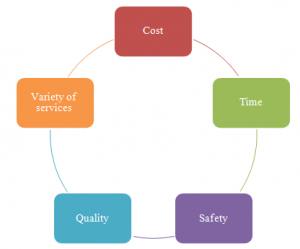
Figure 2: Shipping factors
(Source: Nowińska, 2019)
Insurance and bank options: ALC UK Ltd. would follow rules of credit agents to incur insurance under this option (Parthibaraj et al. 2018). In order to address such purpose, they must take help from export finance of UK to support exports, import business and assess overseas therein.
Researching the Shipping Options, Documents and Applicable Laws
The checklists are mentioned below:
Shipping: The process of shipping of cars in ALC UK Ltd. involves flow of documents and goods from the UK to its destination where it needs to export the products. ALC UK Ltd. would process its shipping aspects with synchronization to complete its shipping services. This organization would export cars to other countries, such as USA by sea and it would track and monitor its shipping products unless and until they are shipped to their destinations.
Payment: Being at the initial stage of business, specific profit margin is going to be earned by this shipping organization and ALC is going to expand its business by introducing new goods in its exporting business. As cited by Pantouvakis et al. (2017), many other clients will be shared by the companies of logistics to this organization that increases its profit margin. ALC UK Ltd. will get paid by completing their shipping of goods to their destination.
Mitigating risk: few risks can take place in the industry of shipping to ALC such as damage and loss to the cargo that contains goods cars, unexpected and additional cost of storage and others, disruption and delay of supply chain, death or injury and others (Nowińska, 2019). These risks can be overcome by implementing few suggestions such as the employees and workers at cargo should be careful with their duties. The shipping industry should evaluate the weather report to minimize the risk of shipping through sea.
Disputes: different types of disputes can be often found in ALC UK Ltd. that may be connected in form of the contract, services, and others. The range of shipping disputes can be formed by solving simple matters quickly through discussions to the complex (Nikcevic, 2018). Legal actions of multi-jurisdiction can create disputes worth million dollars in this shipping organization. Regulations and laws of dispute act may be helpful to mitigate these issues of contract in ALC UK Ltd.
Career option: ALC UK Ltd. is going to pursue different types of career options in order to increase its benefits and profit margins. It is going to include the shipments of crude oil, turbojets, gold (unwrought) and other goods such that its business may increase in the UK for exporting goods to the USA and other countries. According to Liu et al. (2018), only one carrier option is not better that is why this organization will expand its shipments business in the UK and other countries. This will provide competitive advantage to this organization over its competitors in the industry of shipments.
Contracts and quotes: Ocean carrier’s viability will offer instant guarantees and quotes of capacity on sailing for ALC UK Ltd. However, this shipping organization is not ready for quotes as its capacity is not sufficient with respect to the carrier quotes in the shipping industry in its initial stage (Lafte et al. 2018). This organization will increase its capacity and its freight rates would be increased as well in the marketplace.
The key documentation is essential and is required by ALC UK Ltd. in the industry of shipping to deliver the goods to the destination. Few documents are required such as:
- Proforma invoice: This can be seen as commercial invoice, which specifies transaction between seller and buyer and would provide detailed description of goods. This document must be kept by this organization to complete shipment process. The prices and system classification of goods will be also mentioned in this invoice. For example, it is a document that the seller issues to buyer or exporter issues to importer for confirming intentions of buyer of purchasing order. ALC will use this document in its shipping business.
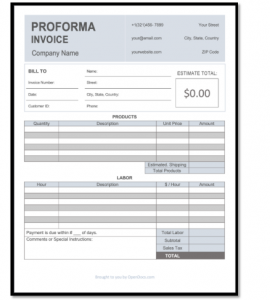
Figure 3: Proforma invoice
(Source: Kooij et al. 2018)
- Commercial invoice: It will include details of the entire transaction of the exportation from starting of the shipment to its completion. As cited by Kooij et al. (2018), ALC UK Ltd. should include relevant information about marine insurance and other details which will ensure full payments and delivery of goods to its customers. For example, it is legal document between supplier and customer of ALC which describes due amount on customer and sold goods.
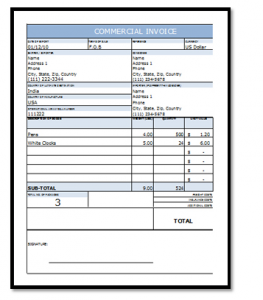
Figure 4: Commercial invoice
(Source: Koilo, 2019)
- Packaging lists: This organization should keep packing lists updated which will provide use of adequate information of freight forwarder for creating bills for shipments. This list will be helpful to identify location of packed items and goods. This will provide full information of packed goods to search for it in cargo.
- Certificates of origin: This will provide information about goods and other products, including origin of packed goods (Koilo, 2019). This organization needs to sign and keep this certificate and should mention origin information of the product on commercial invoice.
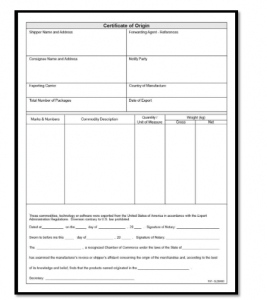
Figure 5: Certificate of origin
(Source: Harris, 2017)
- Shipper’s instruction letter: It is one of the most important documents that should be kept by ALC UK Ltd. to complete exportation process (Harris, 2017). This document will help to ensure that goods have to be taken care of properly. The letter should be provided to the forwarder while instructing him about delivery. For example, it is a form of letter of ALC in which it instructs freighter forwarder for handling export shipment.
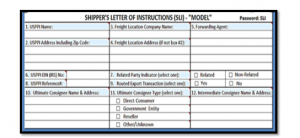
Figure 6: Shipper’s letter for instruction
(Source: Halff et al. 2019)
- Lading bills: This should be kept by AC UK Ltd. as it is required for the international shipping which should be created for export (Halff et al. 2019). This bill is consigned to buyers however it is required in international shipment process.
- Bank draft: This is important in process of international sales for transferring control of exported goods from sellers. According to Karakasnaki et al. (2018), this essential document should be kept to complete the shipment process. Usually, bank of seller will send this draft via freight forwarder to bank of buyer. Bank draft can be included in letter which will include additional documents and transactions of bank draft.
Applicable law
Trade law: This has been made in UK to empower and protect customers by whom faulty products and goods have been purchased from business. Trade law will be applied to ALC as it is going to start its business for exporting cars to USA. ALC will be regulated and governed by trade law in UK government. Practices of trade law will prevent unfair trading and will be helpful for its business. UK trade can be seen exactly as EU law that is why ALC should follow the laws of EU as well.
UK trading law is derived from EU law that is why trade law is implemented by EU directive. This shipping organization should obey all the rules and regulations of UK trade law and EU law. Regulations of trade law will be applied on the business of ALC shipping services and will affect its business and its shipping process. ALC should be careful of unfair marketing, unfair advertising, unfair trading practices to lure customers as all these forms are banned by regulations and rules of trade law.
Goods sale act of 1979: This lies under Trade law of UK and under this act, consumers may reject items and goods that they purchased when items goods or items are not of satisfactory quality (Thelawreviews.co.uk, 2019). ALC needs to be careful about this Act as it is essential to be followed to attain success as it is going to start. This organization should follow regulations of this particular act to follow supply process properly such that no faults and defects can be found in its goods and services.
ALC should take care of its cargo where its goods will be stored however its goods will be rejected by customers if they can find any fault on the delivered goods. The section of “refunding of faulty goods” under this should be carefully evaluated by this organization as if the delivered goods will not be satisfactory to the customers then this organization will have to refund the amount of the paid goods (Contactlaw.co.uk, 2019). ALC should make its shipping process appropriate and accurate under regulations of UK trade law to run its business across countryside.
Merchant Shipping Act of 1995: ALC should apply Collision regulations of 1972 and Collision convention of 1910 to expand its business internationally and to establish its business in UK.
Besides, this organization should follow acts of pollution such as pollution prevention (MARPOL) 1973 with 1997 and 1978 protocols in order to prevent pollution in marine environment, thereby ensuring protection in business. According to Dunne (2019), these pollution prevention protocols should be followed during the shipment process of its goods while delivering them in other countries.
Few recommendations can be applied to mitigate the issue that may arrive in the shipping business of ALC. The recommendations are as follows:
- ALC has just started its business of shipping that is why low demands can be faced by this shipping organization. This organization should not increase its supply chain as its demand in market has not been established until now (Dewan et al. 2018). This shipping company needs to control and minimize its supply such that its freight rate should not decrease. ALC should be careful that its fleet rate should not cross its freight rate which will lead this company to loss.
- This shipping industry should be careful of its safety purpose. Safety is most essential and important factor which should be followed by this organization to protect its employees and workers on cargo and its goods as accidents often occur in shipping industry. As cited by Cajaiba-Santana et al. (2020), this company has started its business recently and that is why safety should be the priority of the organization to mitigate the issues of safety at the working place. All the employees and workers should equip safety gear while they are going to ship goods to different countries.
- ALC should follow act of value-added in 1994 of UK to establish its shipping business and undergo exports largely (Alexandridis et al. 2020). This organization should be careful regarding its shipped cars as any default regarding the shipped cars such as damage or loss would make a penalty on ALC and then it would have to refund the whole amount to the customer according to law. This organization should be careful of its shipping process from overcoming the issues of acts and laws.
Based on the above analysis, it can be concluded that the environment of international business and trade has been mentioned with respect to ALC UK Ltd. Shipping process of cars by ALC has been mentioned which delivers cars from UK to USA. Application to practices has been mentioned in which origin and destination, goods and carriers have been described as well. Shipping factors such as cost, time, quality, variety of services and safety have been mentioned concerning ALC. Shipping cycle and checklists have been mentioned as well regarding this organization. Applicable documents of UK have been discussed which should be required by this organization to run its business according to the government’s acts. Trade law, EU law, Goods sale act, section of refunding of faulty acts and merchant shipping acts have been described as well which will be required by ALC to establish its business under the UK.
Alexandridis, G., Antypas, N., Gulnur, A. and Visvikis, I., 2020. Corporate financial leverage and M&As choices: Evidence from the shipping industry. Transportation Research Part E: Logistics and Transportation Review, 133, pp. 82-87.
Cajaiba-Santana, G., Faury, O. and Ramadan, M., 2020. The emerging cruise shipping industry in the arctic: Institutional pressures and institutional voids. Annals of Tourism Research, 80, pp. 88-96.
Contactlaw.co.uk, 2019, Trade laws, <https://www.contactlaw.co.uk/commercial-trade-law/3022-trade-laws.html>
Dewan, M.H., Yaakob, O. and Suzana, A., 2018. Barriers for adoption of energy efficiency operational measures in shipping industry. WMU Journal of Maritime Affairs, 17(2), pp.169-193.
Dunne, T., 2019. MARPOL Annex VI: Disproportionate Burden Or Necessary Regulations for the Greater Good: How Pollution Controls on the Shipping Industry Are Currently Affecting and Will Continue to Affect Maritime Commerce and the Global Environment. Tul. Mar. LJ, 44, pp. 187-193.
Halff, A., Younes, L. and Boersma, T., 2019. The likely implications of the new IMO standards on the shipping industry. Energy policy, 126, pp.277-286.
Harris, B.A., 2017. Turn Down the Volume: Improved Federal Regulation of Shipping Noise Is Necessary to Protect Marine Mammals. UCLA J. Envtl. L. & Pol’y, 35, pp. 198-206.
Karakasnaki, M., Vlachopoulos, P., Pantouvakis, A. and Bouranta, N., 2018. ISM Code implementation: an investigation of safety issues in the shipping industry. WMU Journal of Maritime Affairs, 17(3), pp.461-474.
Koilo, V., 2019. Sustainability issues in maritime transport and main challenges of the shipping industry. Environmental Economics, 10(1), pp. 48-54.
Kooij, C., Loonstijn, M., Hekkenberg, R.G. and Visser, K., 2018, June. Towards autonomous shipping: Operational challenges of unmanned short sea cargo vessels. In Marine Design XIII, Volume 2: Proceedings of the 13th International Marine Design Conference (IMDC 2018), June 10-14, 2018, Helsinki, Finland (pp. 871-879).
Lafte, M.B., Jafarzad, O. and Ghahfarokhi, N.M., 2018. International navigation rules governing the unmanned vessels. Research in Marine Sciences, 3, pp.329-341.
Liu, C.L., Shang, K.C., Lirn, T.C., Lai, K.H. and Lun, Y.V., 2018. Supply chain resilience, firm performance, and management policies in the liner shipping industry. Transportation Research Part A: Policy and Practice, 110, pp.202-219.
Nikcevic, J., 2018. Montenegro on the Path to Paris MoU Accession: Towards Achieving a Sustainable Shipping Industry. Sustainability, 10(6), pp. 190-198.
Nowińska, A., 2019. Ships and relationships: Competition, geographical proximity, and relations in the shipping industry. Journal of Business Research, 101, pp.161-170.
Pantouvakis, A., Vlachos, I. and Zervopoulos, P.D., 2017. Market orientation for sustainable performance and the inverted-U moderation of firm size: Evidence from the Greek shipping industry. Journal of Cleaner Production, 165, pp.705-720.
Parthibaraj, C.S., Subramanian, N., Palaniappan, P.L.K. and Lai, K.H., 2018. Sustainable decision model for liner shipping industry. Computers & Operations Research, 89, pp.213-229.
Thelawreviews.co.uk, 2019, The Shipping Law Review – Edition 6, <https://thelawreviews.co.uk/edition/the-shipping-law-review-edition-6/1195050/england-and-wales>
Wan, Z., El Makhloufi, A., Chen, Y. and Tang, J., 2018. Decarbonizing the international shipping industry: Solutions and policy recommendations. Marine pollution bulletin, 126, pp.428-435.
Wells, P., Pettit, S., Abouarghoub, W., Haider, J. and Beresford, A., 2018. Future CO2 emissions from shipping: four-scenarios using a multi-level perspective–a proposed methodology. In SHS Web of Conferences (Vol. 58, pp. 24-31).
Yuen, K.F., Wang, X., Wong, Y.D. and Zhou, Q., 2017. Antecedents and outcomes of sustainable shipping practices: The integration of stakeholder and behavioural theories. Transportation Research Part E: Logistics and Transportation Review, 108, pp.18-35.
Yuen, K.F., Wang, X., Wong, Y.D. and Zhou, Q., 2018. The effect of sustainable shipping practices on shippers’ loyalty: The mediating role of perceived value, trust and transaction cost. Transportation Research Part E: Logistics and Transportation Review, 116, pp.123-135.
Zhang, P., Shan, D., Zhao, M. and Pryce-Roberts, N., 2019. Navigating seafarer’s right to life across the shipping industry. Marine Policy, 99, pp.80-86.


